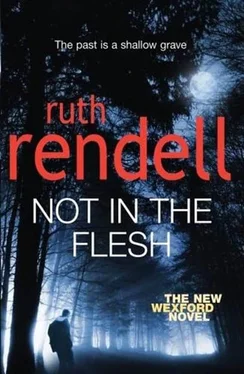“Doris Lomax, that's the woman next door, said she died of a broken heart. There was quite a hunt for Cummings. I mean, you can see there would have been, with him not being normal and never going out much except to the village shop. That's where he went on that day in December. It was in the morning. He went to the shop to get a loaf and a packet of tea bags and he was-well, he was never seen again. Mrs. Cummings went next door to Mrs. Lomax and I gather Mrs. Lomax sort of took charge. She phoned us and then practically the whole village turned out to hunt for him.”
“I remember this case,” Wexford said. “I remember it well, and you must, too, Mike.”
“I got involved in the search. We turned the place over, looking for him. It was like a search for a child.”
“I suppose he was a child,” said Wexford sadly. I just hope, he didn't say aloud, that dreadful thing in Grimble's Field isn't him. I'd like to find he'd turned up, living in Brighton with a kindly woman as childlike as himself. “And now, if you and Hannah and maybe Damon will start tracking down previous owners of houses in Pump Lane and the Kingsmarkham Road, you and I, Mike, will have another session with Grimble.”
A phone call to Theodore Borodin at his London home disclosed that Ronald and Irene McNeil had sold him Flagford Hall seven years before. It was a large house, almost a stately home, too much for the aging couple to cope with.
“They were getting on a bit,” Borodin said. “The time was coming when they wouldn't be able to drive. They needed somewhere to live near the shops. The only one in Flagford's hopeless. Old McNeil was eighty and she wasn't much younger, and now I come to think of it, someone told me he'd died.”
“But they must have been there,” Damon Coleman said, “when this murder and the subsequent burial took place.”
“Certainly they must have.” Borodin went on to describe in unnecessary detail what a state Flagford Hall had been in, what enormous sums of money he had been forced to spend on it, how costly was its upkeep, considering he only used it at the weekends, until Damon politely cut him short and thanked him for his help.
The house, largish, detached, perhaps no more than eight years old, wasn't far from Wexford's own home. Damon passed it on his way there. The front door was opened by Irene McNeil herself, a heavy sluggish woman who looked every minute of her eighty-four years. Time had dragged down her features until chin blended in with neck and neck sagged over the collar of an unflattering gray blouse.
While Damon tried not to look at her loglike swollen legs, she stared searchingly at him and remarked in a throaty tone, “I expected them to send someone more senior.”
Damon was certainly not paranoid, not even particularly sensitive, about being a black man in still predominantly white rural England. Still, interpreting as otherwise than racist Mrs. McNeil's gaze, which traveled from his feet to the crown of his head and rested incredulously on the face that several women had found exceptionally handsome, would have been impossible.
Having told him he had “better come in,” she led him through the ground floor, lumbering heavily. The interior was the reverse of what Damon expected, hi-tech and minimalist, built-in cupboards, ice-white walls, black tiles, and pale wood floors. In the living room, Mrs. McNeil's antiques and fifties armchairs sat un-easily against this stark background. Lowering herself onto a floral chintz sofa, she proceeded to list the reasons she and her husband had moved from Flagford Hall, a catalog from which Borodin's explanation was absent. Her voice was the most plummy and upper class Damon had ever heard.
The neighbors were impossible, she said, particularly the Hunters and the Pickfords. She knew for a fact Mr. Pickford senior had poisoned her cat, and his saying (very rudely) that he hadn't laid a finger on it, adding that even a twenty-year-old bird-slaughtering fiend belonging to her couldn't be expected to live forever, was a tissue of lies. She had seen Mr. Hunter watching her house through binoculars and taking photographs of herself and her late husband having tea in their garden. But the worst of all were those Tredowns. She was sure there must be a law against a man living with two wives, or if there wasn't, there ought to be. It was the first Mrs. Tredown coming back to live with him and the second Mrs. Tredown that was the beginning of the end. That was when she and Mr. McNeil started seriously thinking of moving, wrench though it was to leave a house they had occupied since their return from their honeymoon. She told, rather than asked, Damon to pass her the framed photograph from an occasional table with a piecrust edge.
“That was Ronald.”
“Your husband?”
“Yes, of course,” said Mrs. McNeil. “Who else would it be?”
Damon looked at the photograph of an elderly but still handsome man with a mustache, “dressed up,” as he put it to himself, in the requisite gear for going hunting, a kind of cap on his head and a red jacket he thought vaguely he ought to call pink.
“Very nice,” he said
It was evidently an inadequate response. Mrs. McNeil snatched the photograph from him and said, “Ronald was a wonderful man.”
Damon said he was sure of it, though there was something brutal in the pictured face and the hands clenched into fists. “Did you know Mr. Grimble?”
“The old one?” said Mrs. McNeil. “He wasn't the class of person one expected to be living in Pump Lane, but, my goodness, he was an improvement on his son. Stepson, I should say. That one's real name, I mean his true father's name, was Darracott, and we all know what the Darracotts are.” Damon, who didn't, listened patiently to the ensuing stream of invective on the subject of Mr. John Grimble (“I call him Darracott”) culminating in the monstrous behavior of a son digging up his stepfather's garden when that parent was scarcely cold in his grave.
“Tell me about that,” said Damon.
“There's nothing to tell,” said Mrs. McNeil, uttering the sentence most likely to cause exasperation if not despair in a policeman's heart. Fortunately, some people, and Mrs. McNeil was one of them, quickly find they have plenty to tell after all. “He and this friend of his started digging a great-well, a sort of ditch or trench. It was high summer, you know, and they dug in an absolutely wanton fashion, right up through poor old Mr. Grimble's garden, ruining a beautiful Rosa hugonis and a bed of calla lilies-I don't suppose you know what those are but no matter-and the friend finished the job, if he finished it. He only worked in the evenings, if you can call it work. And then, of course, or so young Mr. Pickford told my husband, he failed to get his planning permission and they had to fill it all in again.”
“I expect that pleased you.”
“It certainly did. The last thing I wanted was four houses built opposite me. All the same they would have been, all red brick with those picture windows, so-called. Of course that was before we knew we'd move on account of the disgusting behavior going on at the Tredowns.”
“You saw the trench they'd dug filled in again?”
“Oh, yes. I saw the man fill it in. He had his wireless on all the time, full on. I could hear it from Flagford Hall with all my windows shut. Those kind of people can't do anything without that pop music. Ronald used to say it makes them feel uneasy not having background noise.”
“Did you see anything odd at that time, Mrs. McNeil? Anything, never mind how small, you thought at the time was-well, strange.”
“Not apart from that man's wireless set. But that's not odd these days, that's normal.” She hesitated. “Well, there was one thing, though I don't really know that you could call it odd.”
Читать дальше











